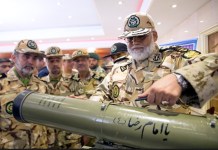Saudi Arabia is seeking “hundreds more” missile rounds for its Patriot air-defense systems. Supplied by the US, the weapon systems are used to shield the country against drone and missile assaults carried by Iran-backed Houthi troops based in Yemen, reported Wall Street Journal.
Riyadh recently requested to buy additional AIM-120 Advanced Medium-Range Air-to-Air Missiles, or AMRAAMs, to empower its fighter jets against these threats, highlighting the magnitude of the difficulty it faces.
In addition, Saudi Arabia’s arsenal of Patriot missiles, which are used to intercept airborne attacks, has depleted significantly.

The Saudi request for more Patriot missile rounds is anticipated to be formally approved by the US. This comes amid concerns in the Kingdom that drone and missile assaults on such a large scale may result in considerable loss of life or damage to important oil infrastructure.
A swarm of missiles and drones successfully bypassed Saudi air defenses in 2019, knocking out half of the kingdom’s oil output temporarily. Houthi fighters took the responsibility for the strikes, but the US and Saudi Arabia allege Iran, which is associated with the Houthis, was behind it.
According to WSJ, the country was targeted by drones more than 50 times in October and November and was impacted by more than 20 ballistic missiles over the same time period.
The Saudis were also turning to Gulf and European allies to restock their Patriot missile supplies, according to unnamed US sources quoted in the same article. However, in these circumstances, the transfer of weaponry to the Saudis would still require US clearance.
“The US is firmly committed to helping Saudi Arabia’s territorial defense, including against missiles and drones launched in Yemen by Iranian-backed Houthi militants,” a senior Biden administration official was quoted as saying. “We’re working closely with Saudi Arabia and other partners to make sure there are no coverage gaps.”
Soon after the Houthis gained control of Sanaa, Saudi Arabia began a military offensive in Yemen in support of President Abd-Rabbu Mansour Hadi. Throughout the nearly seven-year conflict, both sides have been accused of human rights violations and crimes.
While the US initially supported the Saudi-led assault with “logistical and intelligence support”, Biden said in February that the US would no longer back any “offensive operations” in Yemen. The administration stated that it would continue to assist the kingdom’s defense capability.
Patriot Air-Defense Systems
Patriot (MIM-104) is an all-weather, long-range air defense system designed to fight tactical ballistic missiles, cruise missiles, and advanced aircraft.
Patriot has thwarted over 150 ballistic missiles in combat operations throughout the world since January 2015, with more than 90 of those intercepts involving low-cost surface-to-air missiles. Raytheon and Lockheed Martin manufacture these weapons.

More than 240 Patriot fire units have been produced by Raytheon Missiles & Defense and delivered to clients in 17 countries. A track-via-missile (TVM) guidance system is installed on the Patriot missile. The mobile engagement control center sends midcourse correction instructions to the guidance system.
The missile has a range of 70 kilometers and a maximum altitude of over 24 kilometers. The shortest and maximum flying times are less than nine seconds and three and a half minutes, respectively.
During the 2003 Iraq war, US forces stationed Patriot missile systems. The systems were stationed in Kuwait and used the new PAC-3 and guidance upgraded missiles to destroy a number of hostile surface-to-surface missiles.
Israel’s Request
After the May 2021 conflict in Gaza, Israel had asked the US to authorize a $1billion replenishment for the Iron Dome air defense system, which the House of Representatives passed in September 2021.
According to a Congressional Research Service report last year, Israel had received $1.65 billion for Iron Dome through 2020, making it the greatest cumulative beneficiary of US foreign aid since World War II.

Nancy Pelosi, the Speaker of the House of Representatives, earlier stated, “The financing that is being provided to continues and deepens the support. The passage of the law underscores the bipartisan and bicameral support for Israel in Congress. Because Israel’s security is vital to America’s security, security assistance to Israel is essential.”
The Iron Dome air defense system was developed by Israeli defense companies Rafael Advanced Defense Systems and Israel Aerospace Industries. The initial funding for this weapon system was borne by the Jewish country itself. Currently, the US is assisting in the development and sustenance of this program.
President Joe Biden earlier promised to resupply Israel’s Iron Dome missile defense systems, which were deployed in May to intercept rockets fired from Gaza at the Jewish state. During a visit to the region to bolster an Israel-Hamas ceasefire established on May 21, US Secretary of State Antony Blinken also reaffirmed American support for Israel.
- Contact the author at ashishmichel@gmail.com
- Follow EurAsian Times on Google News





